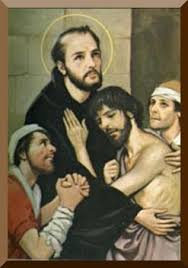HOMILY LENT WEEK 01 02 – Year II
A Non-rescuing God and Our Faith as a Witness
(Is 55:10-11; Ps 34; Mt 6:7-15)
***************************************************
A question that many people continually ask and wonder about is why there is so much suffering in the world if God is good and all-powerful. In fact, the first reading today assures us that the Word of God always accomplishes that which it was sent to do. On top of that, the Psalm 34 today tells us that God is close to the poor and brokenhearted; that God hears the cry of the poor and rescues them from trouble.
So why doesn’t God make life easier for us? Why does God allow us, and so many family members, to suffer so much at times? Why doesn’t God rescue us from our troubles all the time? Perhaps this mystery is an invitation for us to live in such a way that our lives would make no sense if there were no God.
Oblate spiritual writer and theologian Ron Rolheiser provides an answer to that mystery in his book The Passion and the Cross. He has a very pertinent chapter in that book entitled, Revealing God as Fellow-Sufferer and Redeemer, not as Rescuer
Basically, he teaches that the Cross reveals God not as Rescuing God, but a Redeeming God. The story of Lazarus illustrates this truth. This contrasts to a Gospel of Prosperity. This is the theology of the Cross.
Daniel Berrigan once said: “Consider how good you look on wood if you want to follow Jesus.” God is not a God who ordinarily rescues us; God is a God who redeems us. God doesn’t ordinarily rescue us from pain, humiliation and death. Rather, God redeems us from pain, humiliation and death after the fact. Jesus treats Lazarus the same way God the Father treats Jesus. We have a redeeming, not a rescuing God. Jesus never promised rescue and immunity from suffering; rather, in the end he promised redemption, vindication within suffering, and eternal life.
In the Gospel, Jesus teaches us to pray the Our Father. That prayer, day by day, is our support especially in times of suffering. It reminds us that we are not alone – we are a community and family of believers, for God is our Father, never just my Father. We pray for God’s kingdom to come, not ours. According to St Paul, that kingdom is the peace, joy and justice of the Holy Spirit.
Peace and joy are gifts of the Holy Spirit that we can claim, even in times of suffering. Jesus on the cross, was at peace, and perhaps even felt some joy, because he knew he was accomplishing the Father’s will to reveal the depth of the Father’s love for us. God did not rescue Jesus from death on the cross – God vindicated him afterwards through the resurrection.
The real kicker in this prayer is that we pray that God’s will be done, not ours. That is what Jesus prayed in the Garden of Gethsemane – not his will, but the Father’s will be done. And that led him to the cross and crucifixion.
We also pray that we might live one day at a time. Whatever our suffering is, it is easier to bear if we carry it one day at a time.
Above all, we pray for forgiveness and the ability to forgive. That is the core of our faith, and what Jesus was doing on the cross – forgiving those who were crucifying him, even as the Father was not rescuing him from that suffering. And in the end, we pray not to be put to the test – to be given that experience of the apparent absence of God that Jesus experienced on the cross, because our faith is not strong enough yet for that test.
The bottom line of this mystery is that God allows evil and suffering in the world temporarily. We are to have faith; to believe; and to follow Jesus through our suffering to the resurrection that will vindicate us in the end. We are to live Calvary in slow motion, with faith and even with peace and joy in our lives, because we know that God is not so much a rescuing God, as a redeeming and vindicating God.

St John of God
Today the church honors St John of God who was born in Portugal on Marcy 8th, 1495. He worked as a soldier of fortune, an overseer of slaves, a shepherd, a crusader, a bodyguard and a peddler. Wracked with guilt over his wasted life, he sought the counsel of John of Avila, who helped him dedicate himself to the care of the sick and the poor, certainly living out the ideal of fasting Isaiah presents today. Others joined him and they became known as the Order of Brothers Hospitallers or Brothers of St. John of the God. John died on his birthday in 1550 and was canonized in 1690. He is a patron of hospitals and the sick.
The Eucharist that we celebrate now can help us to become people of faith like St. John of God, who live lives of redemptive suffering even with joy, that would make no sense if there was not a God.



